GOODREADS recommend really good reads
GOODREADS recommend really good reads
by Norman Warwick
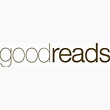
I have come to trust that whatever Goodreads recommend is, invariably, a good read. I´ve only just arrived at the party, to be honest. Until now, a few trusted friends have been my source of literary comment and recommendation. I can look at many of the books on my shelves and remember exactly who pointed me in their direction.
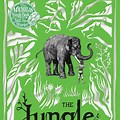
My row of exceedingly good books baked by Mr. (Rudyard) Kipling all began when my godmother, Auntie Jennifer, sent me a hard copy of The Jungle Book, for my ninth birthday, and I have been an avid reader ever since of Kipling´s poetry and prose. Notwithstanding the ´woke´ revisionism of his work and its place in the pantheon he remains my favourite weaver of words.
Tucked away and almost dwarfed by Kipling´s tomes is a tiny pocket-book copy of The Little Prince given to me by the late Rochdale MBC Arts Officer beate Meilemeir for my fiftieth birthday. It changed my life as I began, somewhat belatedly, to grow up.
I think it’s the Guardian who include, in their questions when interviewing authors, a question about what book the writer gives or recommends to friends, which often reveals a side of the author we perhaps haven´t seen before. My own recommendation to friends is The Collected Works Of Billy The Kid by Michael Ondaatje, a work I studied at university twenty years ago as an already (very) matures student. It was a book that showed me that creative writing is not only an art form but is also a skilled craft of sculpting and honing and re-directing.

The unusually-named Carrot Quinn (right) was born in Anchorage, Alaska, and is an author of memoirs and travel guides. She describes herself as a writer and a long-distance hiker and you can find out more about her at http://carrotquinn.com/
Her latest book, The Scenic Route, is the unforgettable story of one woman who leaves behind her hardscrabble childhood in Alaska to travel the country via freight train–a beautiful memoir about forgiveness, self-discovery, and the redemptive power of nature, perfect for fans of WildorEducated.
This new novek is described on Goodreads as
´An urgent read. A courageous life. Quinn’s story burns through us and bleeds beauty on every page´, by the author of Spirit Run: A 6,000-Mile Marathon Through North America’s Stolen Land
The synopsis of The Scenic Route tells us that;
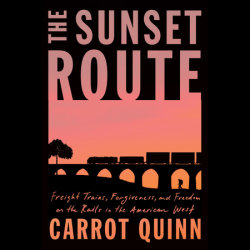
After a childhood marked by neglect, poverty, and periods of homelessness, with a mother who believed herself to be the reincarnation of the Virgin Mary, Carrot Quinn moved out on her own. She found a sense of belonging among straight-edge anarchists who taught her how to traverse the country by freight trains, sleep in fields under the stars, and feed herself by foraging in dumpsters. Her new life was one of thrilling adventure and freedom, but still she was haunted by the ghosts of her lonely and traumatic childhood.
The Sunset Route (left) is a powerful and brazenly honest adventure memoir set in the unseen corners of the United States–in the Alaskan cold, on trains rattling through forests and deserts, as well as in low-income apartments and crowded punk houses–following a remarkable protagonist who has witnessed more tragedy than she thought she could ever endure and who must learn to heal her own heart. Ultimately, it is a meditation on the natural world as a spiritual anchor, and on the ways that forgiveness can set us free´´ .
A goodreads reader, Leig, reviewed it comprehensively and from her we learn that
This is a memoir about grief and neglect, and about being a lost, poor, young, white woman in America—a spiritual successor to Kerouac but more soberly written. I’ve read both of this book’s comps, and though aimlessness is arguably thematically appropriate, this memoir’s most prominent shortcoming is its comparative lack of drive. My review is mixed: it is a personal read about hard topics, and there’s a story here worth telling full of adventure. It taught me a lot about riding the rails. But a number of elements didn’t work for me—the shortage of narrative reflection in the text and structural issues had me skimming through significant swaths, while the lack of significant direction meant the story ended without a strong sense of closure. You could feel potential here, but it never quite actualized for me.
This memoir was strongest in the middle. You can tell it was fleshed out from a shorter work, which created some pacing and structural issues, as well as a bit of a haphazard narrative drive. The structure of the book plays with time in more than one sense: it is a nonlinear narrative, but even when we’re in a linear section, time blends together—days, weeks, or months pass without much remark. This is both one of the more interesting things about the memoir and the area that left me the coldest: often I wished there was some editorializing on the experiences to give a stronger sense of time, of reflection, a deeper delve into the significance of what was on the page. In places, it read a bit like an accounting of what happened, a more direct transliteration from journal to narrative memoir. Accordingly I had a hard time pulling out specific instances of significance and, at times, was lulled into the drudging rhythm of misery that sometimes pervades modern literature.
That said, I too was once a young, lost, white woman on the west coast, so there were elements of this story that spoke to me. There was one particular moment of grace that I wish had been drawn forward and given greater narrative significance: the book nearly begins and ends in Alaska (I wish, for thematic reasons, it had begun and end in Alaska). Near the end, the narrator, now an adult, is looking for her mother after two decades away from her, having traveled the country and fended for herself. This was a brilliant bookend, and was the first moment in the memoir I had a sense of a cohesive story and connectivity. If more had been textually made of the idea that these travels were spent looking for something, only for the book to begin and end in the same place, it would have felt like the story and misery had a greater sense of direction. As it is, there didn’t feel like there was a ton deeper than what was on the surface: an accounting of events.
It’s hard to rate a recounting of a person’s experiences. I found the protagonist’s troubles and reactions relatable—the way she throws herself against the world looking for someone who will love her is heart-rending and the definite guiding light of the book. But the format didn’t quite serve the story, and its strongest beacons are somewhat buried under procedural elements and a peculiar sense of time. Notably, for a book with ‘freedom’ in the title, I felt the narrator spent most of the book being demonstrably unfree—diving more into the idea of “freedom,” exploring it, and troubling it is one of the things I felt was missing in this book.
Come to this book for the adventure narrative and don’t, unlike me, think about its bookness too hard, and it’s a quick, emotional read—a different perspective on America written in easily digested prose´.
There is a Goodreads recommendation, too, for legendary musician Richard Marx, who offers an enlightening, entertaining look at his life and career.
´Legendary´, however, was not an adjective that sat comfortably with me when I first read this news of the release of his memoir. That was ridiculously elitist of me, of course. I was aware of his hits, and the fact that he wrote good songs for others too. But all that long, high, blond hair never looked right in the photo file of the song-writers I took seriously. I grudgingly admired the production values of his singles but he sort of danced about a bit on stage and it was all very ´poppy´. I was nearly thirty five or so and very nearly a grown up. Dismissed !
Read on, please as I eat my words.
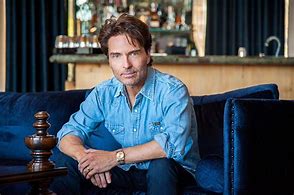
song-writer and author
Richard Marx, I now learn, is one of the most accomplished singer-songwriters in the history of popular music. His self-titled 1987 album went triple platinum and made him the first male solo artist (and second solo artist overall after Whitney Houston) to have four singles from their debut crack the top three on the Billboard Hot 100. His 1989 follow-up, Repeat Offender, was an even bigger smash, going quadruple platinum and landing two singles at number one. He has written fourteen number one songs in total, shared a Song Of The Year Grammy with Luther Vandross, and collaborated with a variety of artists including NSYNC, Josh Groban, Natalie Cole, and Keith Urban. Lately, he’s also become a Twitter celebrity thanks to his outspokenness on social issues and his ability to out-troll his trolls.
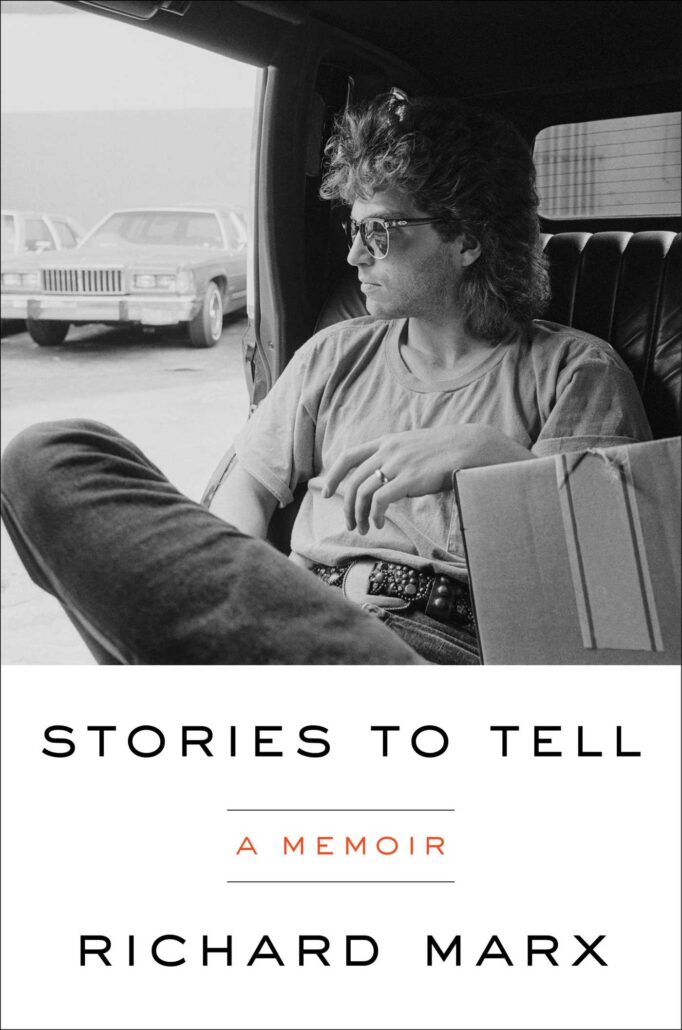
In Stories To Tell, Marx uses this same engaging, straight-talking style to look back on his life and career. He writes of how Kenny Rogers changed a single line of a song he’d written for him then asked for a 50% cut—which inspired Marx to write one of his biggest hits. He tells the uncanny story of how he wound up curled up on the couch of Olivia Newton-John, his childhood crush, watching Xanadu. He shares the tribulations of working with the all-female hair metal band Vixen and appearing in their video. Yet amid these entertaining celebrity encounters, Marx offers a more sobering assessment of the music business as he’s experienced it over four decades—the challenges of navigating greedy executives and grueling tour schedules, and the rewards of connecting with thousands of fans at sold-out shows that make all the drama worthwhile. He also provides an illuminating look at his song-writing process and talks honestly about how his personal life has inspired his work, including finding love with wife Daisy Fuentes and the mystery illness that recently struck him—and that doctors haven’t been able to solve.
Stories To Tell is a remarkably candid, wildly entertaining memoir about the art and business of music.
´Tracy´ reviews it, with an initial caveat that
Okay, if I’m going to be brutally honest here, I’m not a huge fan of Richard Marx, but I do like him… I mean, I can sing along to most of the singles, and he’s a great follow on Twitter. But I’ve never bought any albums or been to a concert, and if you told me I’d plow through his memoir in two days, I’d probably think you were nuts. But I did. I was stunned by the names he’s worked with, and the varied songs, albums, and projects I love that he’s been a part of. This is definitely not a tell-all memoir so don’t expect him to spill much tea (though there is a bit sprinkled in here and there), it’s more of a behind the scenes of his career and the music industry. I definitely have a new level of respect for him after reading about how hard he’s worked and how grounded he has remained. This was a surprisingly great read.
´Jenn The Readaholic´seems to be much in agreement.
Thanks to this book, I’ve officially added Richard Marx to my list of people I’d like to have dinner or even just a few hours of conversation with. He’s open, honest, humble, funny as F (which happens to be one of his favorite words, so add another check in the “pros” column, please and thank you!), and an incredibly classy guy. I already follow his Twitter account and recently discovered his YouTube channel, so I had an inkling of the humor and intelligence behind his “fluffy mullet” (his words), but I was unprepared for how difficult it was to put his memoir down. He doesn’t mince words. He doesn’t have anything nasty, cruel, or unfair to say about anyone, and he owns up to his mistakes as a young man. Don’t get me wrong, there aren’t many mistakes. He’s clearly spent his life working and striving to satisfy both his own ambitions and those of people fortunate enough to encounter him, but he still takes it all with many grains of salt and a healthy dose of self-deprecating humor and comments. He’s made an art out of succeeding at the private life while being the unlikely driving force behind so many wonderful songs and is reminiscent of Springsteen with his absolute refusal to say anything remotely negative about his first wife. His commentary on what most people would deem a “failed marriage” is something that many of my friends who have ended a marriage would take to heart. Heck, his outlook on life in general is why I was so happy to give this book a try. And it’s that same outlook and attitude that kept me enthralled until the very last page.
The blurb on another book that caught our eye says that its author takes great delight in sniffing out bullshit !

The Life-Changing Science of Detecting Bullshitsees writer John V. Petrocelli expanding upon his viral TEDx Talk. Psychology professor and social scientist John V. Petrocelli’s The Life-Changing Science of Detecting Bullshit reveals the critical thinking habits you can develop to recognize and combat pervasive false information and delusional thinking that has become a common feature of everyday life.
Bullshit is the foundation of contaminated thinking and bad decisions that leads to health consequences, financial losses, legal consequences, broken relationships, and wasted time and resources.
No matter how smart we believe ourselves to be, we’re all susceptible to bullshit–and we all engage in it. While we may brush it off as harmless marketing sales speak or as humorous, embellished claims, it’s actually much more dangerous and insidious. It’s how Bernie Madoff successfully swindled billions of dollars from even the most experienced financial experts with his Ponzi scheme. It’s how the protocols of Mao Zedong’s Great Leap Forward resulted in the deaths of 36 million people from starvation. Presented as truths by authority figures and credentialed experts, bullshit appears legitimate, and we accept their words as gospel. If we don’t question the information we receive from bullshit artists to prove their thoughts and theories, we allow these falsehoods to take root in our memories and beliefs. This faulty data affects our decision making capabilities, sometimes resulting in regrettable life choices.
But with a little dose of scepticism and a commitment to truth seeking, you can build your critical thinking and scientific reasoning skills to evaluate information, separate fact from fiction, and see through bullshitter spin. In The Life-Changing Science of Detecting Bullshit, experimental social psychologist John V. Petrocelli provides invaluable strategies not only to recognize and protect yourself from everyday bullshit, but to accept your own lack of knowledge about subjects and avoid engaging in bullshit just for societal conformity.

With real world examples from people versed in bullshit who work in the used car, real estate, wine, and diamond industries, Petrocelli (right) exposes the red-flag warning signs found in the anecdotal stories, emotional language, and buzzwords used by bullshitters that persuade our decisions. By using his critical thinking defensive tactics against those motivated by profit, we will also learn how to stop the toxic misinformation spread from the social media influencers, fake news, and op-eds that permeate our culture and call out bullshit whenever we see it.
A positive review by ´Shawn´ speaks of the work as,
´A fun and well- written book advocating and explaining the need to greater reliance on critical thinking and evidence seeking.
Petrocelli does research from the Wake Forest “Bullshit Laboratory” (yes, I’m jealous) and wow this book seemingly as a textbook for how to help people understand when they someone is using Bullshit on them (from lying) and how they can get better at catching it and avoiding using it themselves.
Were I still teaching, I would want this to be required reading for our science department (or maybe the whole school) to enable us to work critical thinking techniques into every class. One portion that especially jumped out at me was asking “how” instead of “why” questions in order to elicit more evidence based thinking about a topic. Because of this, I would recommend this for anyone who actually cares about understanding the world through the lens of facts and evidence and I would wish that would include everyone !´




Leave a Reply
Want to join the discussion?Feel free to contribute!